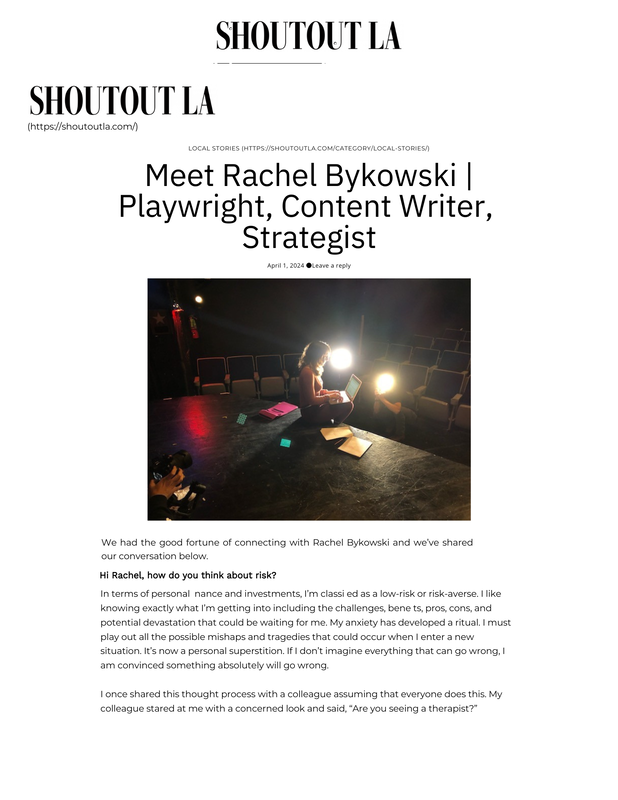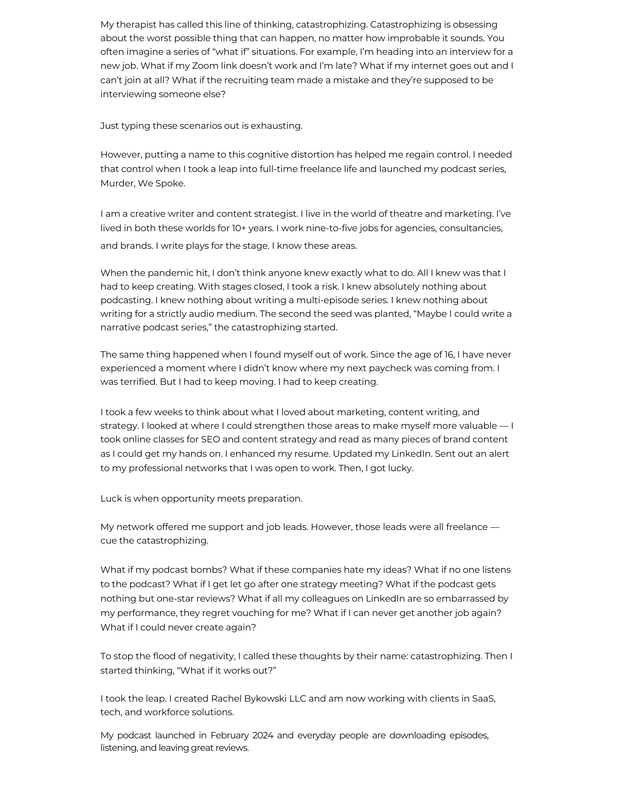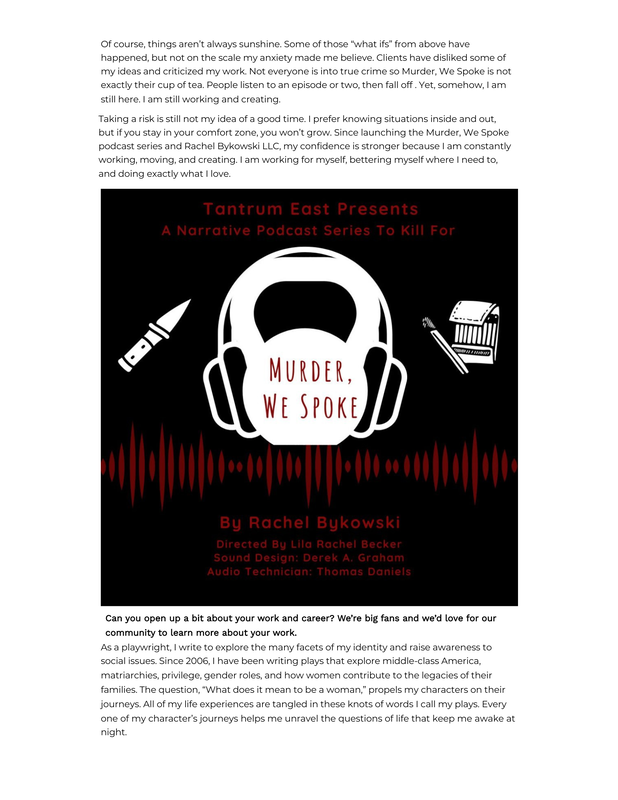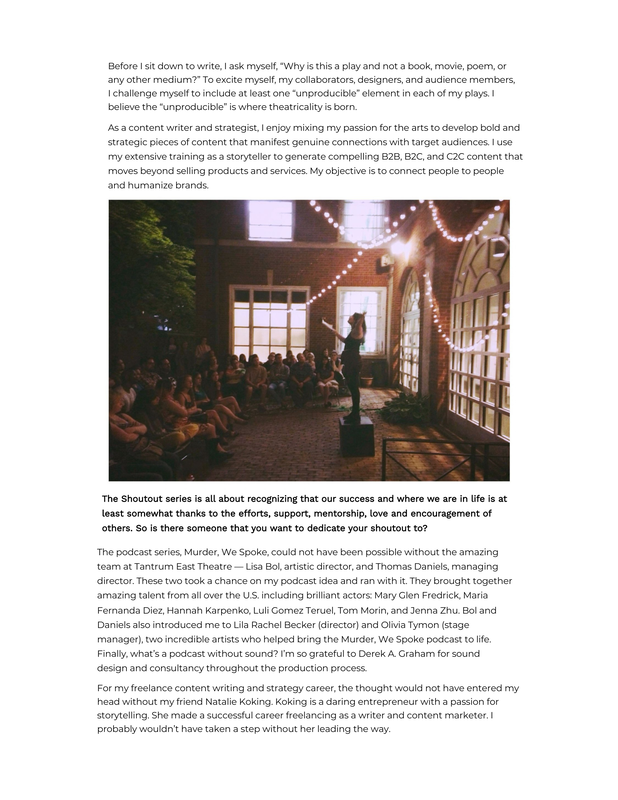"You are in Control"This phrase has been on repeat in my brain since I returned to Chicago. Since mid-August, I’ve been incredibly fortunate to attend the La MaMa Umbria International Playwright Retreat. For ten days, 18 brilliant playwrights and myself stayed in a breathtaking villa in Spoleto, Italy. Our guest instructor, Chay Yew, led us through various writing prompts, imagination exercises, and thought starters to help us craft our writing. To say I was intimidated by this talented group of people is an understatement. I was terrified. I was sure my attendance in the program had to be a mistake. I am a middle-class, paycheck-to-paycheck girl from the southside of Chicago. People like me don’t “go to the beautiful Italian countryside” to “reset” and “find inspiration.” Looking around the room at my fellow writers – artists you should be following because their writing will blow up one day – I was amazed by their questions about the state of the theatre industry and their uncertainty about the future of new play development. Between the writer’s strike, the rise of A.I., and the pandemic’s decimation of many theatrical institutions, we all came in with a similar question for Chay and each other: How do we and our new plays survive? We all shared career paths, trajectories, tips & tricks, connections, how-to’s, do’s & don’ts, failures and successes. We searched for a formula to crack the code on the evolving new play development landscape. By the end of the retreat, what I discovered was not a “one-size-fits-all” formula. Instead, I needed to shift my perception of myself and place myself in the driver’s seat of my playwriting career – not a passenger waiting for a theatre to pick me up. 3 Ways To Find New Play Development Opportunities We will all come across ensembles, theatres, and institutions that value our plays and us as writers. These places are our homes. No matter how big a budget or small a black box, these theatres want to nurture our voices. Stay with them and invest in them. Their admiration is faithful.
In any playwright’s career, we will meet numerous people and walk into rooms we never dreamed we could enter. But not all that glitters is gold. Find your people, support each other, and put your voice first, always. If the play is “good,” institutions will notice but don’t rely on them to drive your career. You are in control. Find the people and places that see your value. In honor of spooky season, I’m writing about ghosts...ghosting...theatre companies whose spirits haunt playwrights with echoes of promises like, “We love your work! We just don’t have the budget to produce it...right now.” Or something like, “You’re a promising artist. We can’t accept you into the program this year, but please apply again next year…and next year, and next year, and next year, neeeexxxxttttt yyyeeeeeeaaaarrrr….” On and on, those words are whispered into our ears and when we turn to see where the sound is coming from – WHOOSH – it disappears into the night. When I started my playwriting career, I was told opportunity would beget opportunity. Acceptance into a festival, conference, workshop, or reading would expand my network and introduce me to producers, literary managers, and artistic directors. These gatekeepers would see my work and give my plays a home on their stages. Take every opportunity. Say yes to everything. Big or small. With or without pay. It’s time to break this haunting curse. Here are four ways playwrights and theatres can rid ourselves of these ghosts.
Have I been accepted into playwriting workshops and festivals? Yes. Have I met amazing artists whom invested their time and talents into directing, acting, and designing my plays? Yes. Have the theatre companies that hosted these workshops and invited these artists to collaborate on my plays said wonderful things about all the work we completed and can’t wait to see the play taken to the next stage of development? Yes. Have those theatres ever offered to take the play to the next stage of development? Nope. Well, okay, a few (you know who you are). I would say out of all the festivals I’ve been a part of, in addition to all the opportunities I’ve been a semi-finalist for, only about 16% of those theatres actually did something, ANYTHING, to help further develop and/or promote the play. The other 84%, once the festival wraps, we all say our goodbyes, and then – 365 days later – the theatre company welcomes another play with another group of amazing artists and says the exact same words to them. A powerful spell is cast over all of us and we remain haunted by the promise that maybe, one day, they will make good on their words of new play advocacy. There are thousands of submission opportunities for playwrights to apply. And the cycle continues again and again, year after year. Thousands of opportunities, thousands of plays and not even half of those get accepted. And, way less than half of those accepted plays ever receive that next level of commitment from a theatre. We create a new play graveyard where the ghosts of apathy, disingenuity, and aloofness haunt our hopes of ever raising our plays from the grave. Let’s break this cycle, end this curse, and breathe life into old work, that is actually still new work viable for the stage.
|
About the BlogI write plays. I tell stories. I create content. I vent. I offer advice. I hope people will learn from my mistakes. Categories
All
Archives
April 2024
|















 RSS Feed
RSS Feed